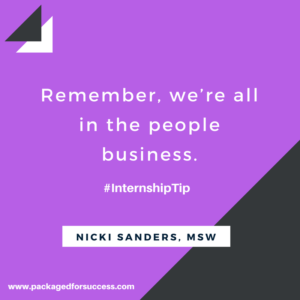Some say that a field placement is a time of education/learning and not training. I disagree. I believe that you a field placement is the opportunity to apply what you’ve learned in the classroom outside of the classroom (training) while learning more about the field and clients than you could in a classroom. Your field placement is the time to decide your next academic and career steps based on the education and training you have received.
Here are 10 ways to make the most of your field placement.
- Research Your Placement – Please do not just “take what you can get”. Research your placement options and if you are unable to land your field placement first choice then research your assigned placement. Having knowledge of their mission, population, services, and supports is invaluable as you integrate into the agency.
- Expect To Succeed – I’m sure you’ve heard the saying, “your attitude determines your altitude”. Expecting to succeed is as much about having a positive attitude on day one as it is about having the confidence to believe in your education and skills. Squash negative emotions.
- Put Your Clients First – Your field placement is a time to learn and develop as a professional but never forget that your clients (whether individuals, groups, agencies or systems) are your main priority. This notion will help you evaluate your decisions and operate in integrity. You also want to keep that in mind if times get tough.
- Do Your Best – Think of your field placement as a “real” job and do your best. Although this is a time of learning and training, you still want to do your best so that you have an adequate evaluation of your skills and abilities. Also, always remember to remain professional in your actions and words.
- Be Coachable – You can’t know everything. None of us do. To maximize your learning and make the most of your field placement, you want to remember to remain in the mindset of a student and be coachable.
- Take On One Complete Project – If you really want to gain valuable skills and knowledge, understand your strengths and weaknesses, and fully integrate yourself into your field site, then take on one complete project from beginning to end. This is especially important for macro social work students. You will build your resume while you build your own capacity.
- Advocate For Yourself – Field Supervisors can get busy and forget about supervision. Employees can be rude or condescending. The work you’re assigned can be unrelated to your career goals. I hope that you do not experience any of these scenarios, but if you do, you must advocate for yourself like you have been taught to advocate for your clients. This is a life skill that will serve you throughout your social work career.
- Ask Questions – The only dumb questions are the questions that were never asked. Satisfy your curiosity by asking questions that relate to your academic and career interests. Don’t save all your questions for your supervisor during individual supervision. Your colleagues are also a wealth of knowledge.
- Use Supervision Fully – Supervision is the sacred time set aside to talk about your accomplishments, fears, and challenges. Good supervision keeps you motivated and learning. Prepare for supervision with questions, updates, and ideas. Be honest in your reporting and evaluation of yourself, your clients, and your agency. Finally, be open to honest feedback – positive or negative.
- Self-Care – You can’t pour from an empty cup! Know your triggers and your limits. Set healthy professional boundaries and remember to make the time to maintain your mental, physical, and emotional health and wellness. Create a self-care plan to replenish yourself when you have worked beyond a healthy capacity. Self-care is not selfish, it is essential to a long, vibrant career in social work.
Related:
- 5 Things You Should Never Say To A Social Work Student
- What Makes A Great Intern?
- 10 Things I’ve Never Heard My Interns Say

Nicki Sanders, MSW, is a travel and cupcake lover with a passion for self-discovery and career advancement. She has an extensive background in developing and managing interns and successful internship programs. She is an accomplished manager, professor, coach, trainer, and group facilitator who has packaged her Master of Social Work degree and 20 years of diverse work experience into Packaged For Success Enterprises, a full-service training and professional development company.
© 2018 Copyright Protected. ALL RIGHTS ARE RESERVED.